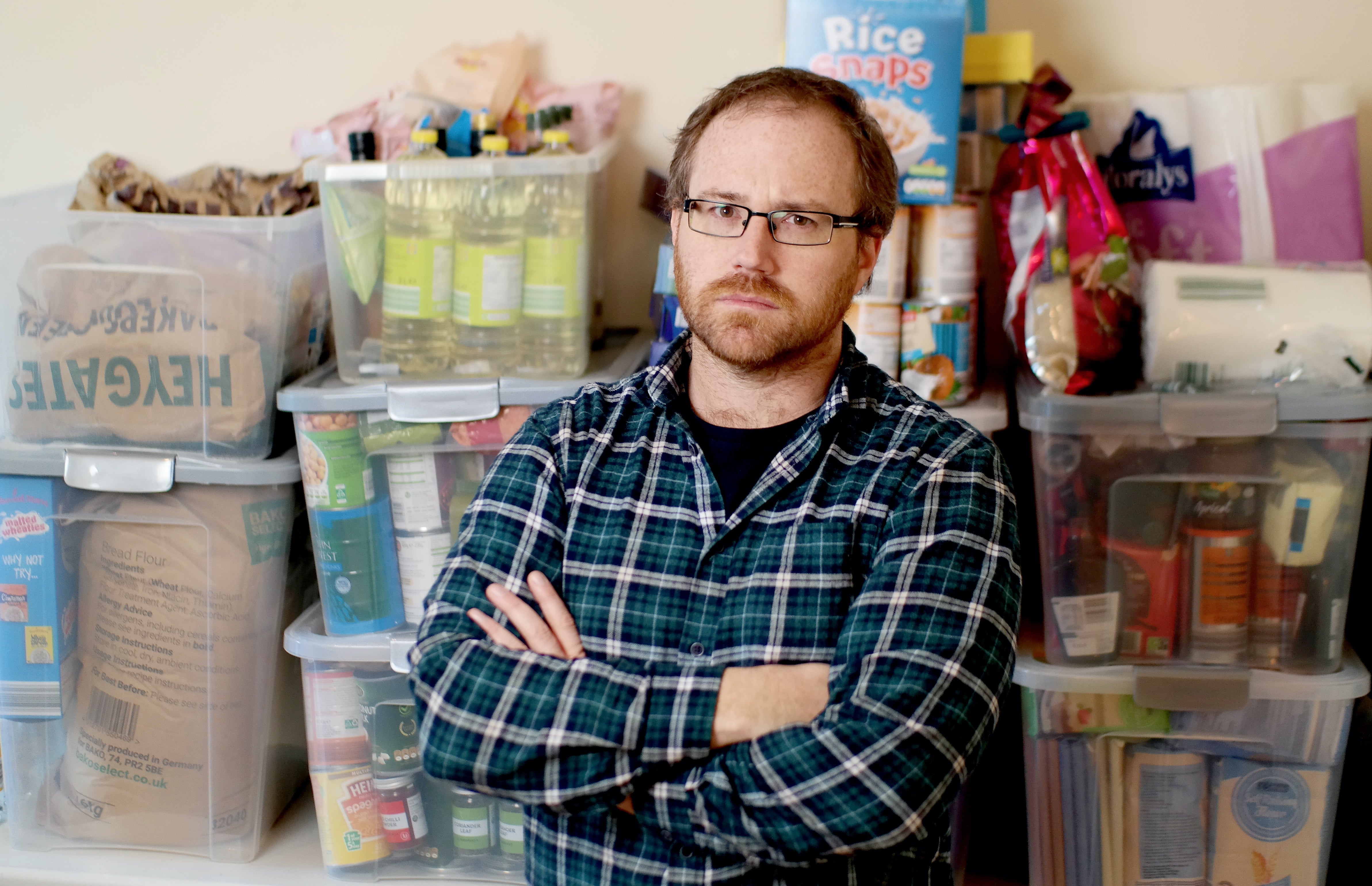‘It’ll be chaos’: Brexit preppers share their fears for 2021
Britons who fear disruption and decline tell Adam Forrest how they’ve been getting ready


Your support helps us to tell the story
From reproductive rights to climate change to Big Tech, The Independent is on the ground when the story is developing. Whether it's investigating the financials of Elon Musk's pro-Trump PAC or producing our latest documentary, 'The A Word', which shines a light on the American women fighting for reproductive rights, we know how important it is to parse out the facts from the messaging.
At such a critical moment in US history, we need reporters on the ground. Your donation allows us to keep sending journalists to speak to both sides of the story.
The Independent is trusted by Americans across the entire political spectrum. And unlike many other quality news outlets, we choose not to lock Americans out of our reporting and analysis with paywalls. We believe quality journalism should be available to everyone, paid for by those who can afford it.
Your support makes all the difference.People have told stories about the end of the world for as long as they’ve gathered around the fire at night. There’s a strange thrill in imagining the very worst. In fact, the apocalypse is something of a hobby for the hardcore preppers who get together and catastrophise.
Tom Linden, a 62-year-old prepper from Yorkshire, says he and his friends like to argue about cataclysmic possibilities whenever they go camping: nuclear war, global contagion, asteroid strikes, solar storms and cyberattacks knocking out most of the world’s internet (Tom’s personal choice of looming danger).
“We’ll sit around and have some heated discussions about the biggest threats,” he says. “Everyone has their own opinion. But the big things are never quite what you expect. I wouldn’t have said a pandemic would ever have hit this country and affected it quite so badly. You’re never sure what’s around the corner.”
We do know about one massive event which is just around the corner. Many of us are living in dread of the moment the bells toll on New Year’s Eve and Brexit becomes real. And our exit from the EU’s single market and customs union – very likely without any trade deal – has turned anxious types, like me, into part-time preppers.
I’ve been stashing away tins, rice and dried pasta in half-a-dozen boxes for the past six months or so. And I’m not the only one. Fellow pessimists have been stockpiling food in much larger quantities, kitting themselves out with torches and first-aid kits – even investing in water purification systems and back-up generators.
Graham Hughes, a 41-year-old travel writer from Liverpool, has filled every cupboard and a dozen large boxes of spare food – enough to last him, his partner and her two daughters for the first three months of 2021. He is in no doubt strange and difficult days lie ahead.
“It’s hard to compute for some people, because we’re still in a bubble of British exceptionalism where we think nothing every goes wrong here,” he says. “We’re not remotely prepared for this as a country, and we have such an incompetent government. There will be huge supply problems. No question. And I don’t think those problems are going to get ironed out in a couple of months. It’ll be chaos.”
Some may laugh. Indeed some have laughed – chuckling dismissively at “barmy” Brexit preppers at previous points in the process. Brexiteers often like to bring up the fact we Brits survived two world wars.
One side of the brain knows the nation will survive Brexit materially intact. The other side is terrified of just how bad things will be. The government’s own worst-case scenarios are bleak, warning of food and medicine shortages, price rises and social unrest.
Add in the potential impact of no-deal tariffs, a relapse into a more primitive form of capitalism, and the picture becomes nightmarish. It seems rational to be scared about the serious economic decline Britain is facing – a decline so huge and humiliating, it feels like some form of collapse.
Georgina Porter, a 50-year-old locum doctor working in the southeast of England, has found her Brexit anxiety growing rather than easing throughout this year – watching in horror as Boris Johnson and his ministers failed to get real about our economic exit.
In August she told her Twitter followers she was stockpiling food in preparation. “Is anyone else doing this or am I paranoid?” she asked.
“I was astonished, because I thought people would say, ‘Don’t be silly, you’re being paranoid,’” Porter recalls. “But there were hundreds of people saying they were doing the same or planning on doing the same. Some people said they were getting generators and camping stoves.”
Since August, Porter has stockpiled enough food to last around three to four months. But she is finding it little comfort, considering the scale of the damage we’re set to inflict upon ourselves. “In some ways it feels kind of ridiculous to stockpile,” she sighs.
“We’re still living in one of the richest countries in the world. And up until fairly recently it felt like a well-functioning country. But not anymore. It just feels sensible to start preparing for serious shortages and a serious crisis. It’s like we’re on a ship going into a massive storm.”
Lincoln Miles, who set up his online UK Prepping Shop back in 2014, has seen a huge amount of new interest in prepping during 2020. He says orders have shot up tenfold since the first Covid lockdown in March. “There’s been this monstrous rise in sales – it’s gone through the roof,” he says
“For the first few months there was huge demand for survivalist kit, water purification systems, gas masks,” the entrepreneur explains. “The demand has carried on, but in the last few months there’s been a shift to ration packs containing freeze-dried food, which may be because of Brexit.”
Some have found solace in getting really serious about their prepping. An interest in the great outdoors has helped them slip more easily into the thinking about self-sufficiency.
Honor McCullough, a 65-year-old living in the west of Scotland, says she has enough food to last her for an entire year – having turned her spare room into “a warehouse” full of supplies. The wild camping enthusiast has also stocked up on water purification tablets.
“You drop them in so they kill any bugs,” she explains. “It’s just in case the water supply doesn’t stay reliable. You know, I used to think the American-style preppers were nutballs. But I suppose I have more respect for them now – maybe they’ve been on to something.”
McCullough works in a supermarket and says she has “a pretty good idea” of how much of our stuff comes from overseas and how short-term the supply of stock actually is. “I think people are in for a shock. I can see problems for a long time. I think we’re going to be a lot worse off as a country because of Brexit.”
She adds: “What happens if you lose your job next year? How are you going to get through those weeks waiting for universal credit? If it were to happen to me, at least I’ll have reduced the amount I need to spend when food is going to get more expensive. It gives me some sense of control – a limited sense of control.”
Others are unable to take much comfort in their own efforts to prepare. Jo Elgarf, 45, is worried about the potential for medicine shortages, since her daughter relies on two epilepsy medicines which come from the EU.
The Londoner has about six weeks’ worth of food tucked away. Like others, she bought a few extra items with each big shop when the supply chain could cope with it this year. But she has no way of getting more than five to 10 days’ worth of those vital epilepsy medicines.
“I’m very, very worried about it,” she says. “It’s the one thing we can’t do without. I’ve been reading different things about the national stockpile of medicines during 2020, and they’re not back up to where they were. I think we’re in a more vulnerable situation in leaving [the EU] now than when we might have left last March.”
Given the scale of these potential problems, given the number of businesses which may struggle to survive, staring at a pile of soup cans in the corner of your kitchen can feel a bit pathetic.
But for many us, buying up cans of soup was a good way of bargaining down our fears. Fretting about food supply problems ahead is probably a way of displacing deeper worries about longer-term economic ruin.
Is there any way of completely hardening yourself against Britain’s gloomy future, mentally and emotionally?
Bradley Garrett, author of Bunker: Building for the End Times, has spent time with hardcore preppers all over the world – including those who have built themselves multi-storey underground complexes. He has found the best prepared, the ones who have considered every eventuality, are often the most zen.
“Prepping gives people some sense of agency again,” he says. “I thought I was going to run into lots of anxious, paranoid people – but actually I found them to be very much at peace. They’re invested in the future. You have to have hope that there’s going to be a future, otherwise there’s no point in prepping.”
He adds: “I’ve spoken to people living in cramped flats, living from paycheck to paycheck, and when I ask them what they’d do in a disaster they say, ‘Well I’d probably just give up – what’s the point?’ And that to me is weirdly nihilistic – to just accept a collapse.
“I mean, I get it. We’re all so busy with work. Most of us can’t afford to build bunkers. But we do have a chance to reassess priorities and at least become a bit more practical. I used to think about learning a language or learning how to scuba dive – but it makes a lot more sense to learn how to wire sockets or think about installing solar panels.”
Bradley thinks people in Britain are getting a tough lesson on how delicate society is. “The idea of trusting globalisation, trade networks, on-time deliveries – all of these incredibly fragile things – has been so deeply embedded in the UK. I think we’re seeing people get this crash-course in learning how fragile they are.”
Feeling any better about what lies ahead? No, me neither.
If nothing else, we’ll probably get the chance to learn quite a lot about how a functioning society actually works – and how functioning societies actually cooperate – as we watch things break down around us early next year.
It may just help us put the pieces back together again, eventually.


Join our commenting forum
Join thought-provoking conversations, follow other Independent readers and see their replies
Comments